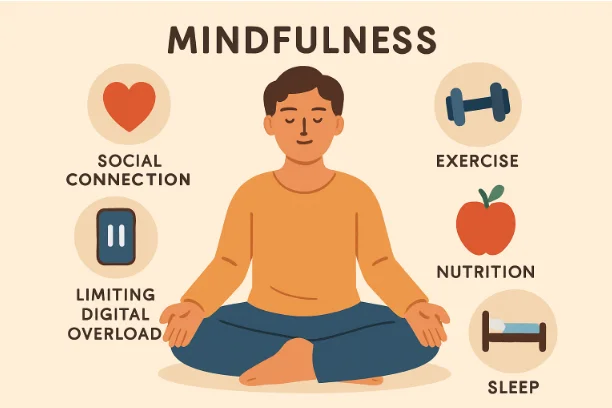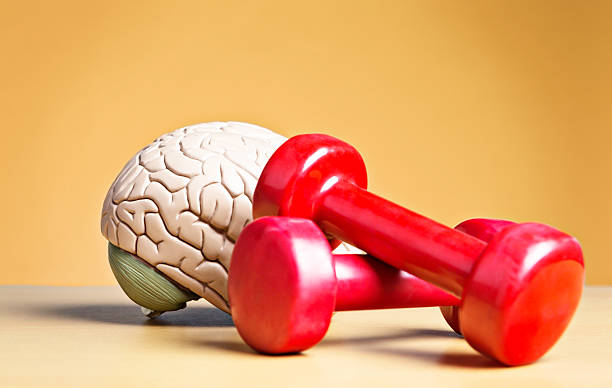Contents
Key Takeaways
- Small lifestyle changes can make a big difference in anxiety management.
- Daily mindfulness, exercise, and healthy routines support emotional well-being.
- Social connection, sleep hygiene, and balanced nutrition play vital roles.
- Professional support may be necessary for long-lasting or severe symptoms.
- Consistent self-care can build long-term resilience against anxiety.
Why Daily Habits Matter for Anxiety
Anxiety is a natural response to stress or uncertainty, but when it becomes overwhelming or persistent, it can disrupt daily life. Simply put, anxiety involves excessive worry, nervousness, or fear that affects how you think, feel, and act. Fortunately, research consistently shows that establishing healthy routines helps provide the predictability and stability that our minds need, especially when we’re feeling anxious.
Daily habits serve as anchors, providing structure in an otherwise unpredictable world. Structured routines signal safety to our brains, which reduces the “fight or flight” response associated with anxiety. Implementing manageable changes—such as setting a regular sleep schedule or exercising regularly—can offer significant relief over time. When daily strategies aren’t enough or anxiety interferes with your quality of life, professional anxiety treatment can empower you with more targeted tools and support for long-term recovery. These habits become even more crucial as stressors accumulate in our modern, always-connected lives. Building a toolkit of daily habits to manage anxiety doesn’t require a complete lifestyle overhaul. What’s most important is finding what works for you through trial and gentle persistence.
Mindfulness and Social Connection
Mindfulness means being present in the moment, noticing thoughts and feelings as they arise without judgment or attachment. Simple mindfulness practices can be integrated throughout the day. Try taking three deep breaths before a meeting, paying close attention to the sensations while eating, or set aside ten minutes for mindful walking. Regular mindfulness has been shown to lower the overall “volume” of anxious thinking by grounding the mind in the here and now.
Staying connected to others is also crucial for managing anxiety. Stress and worries often feel less overwhelming when shared with others. Make time for a call or visit with a friend, participate in a support group, or even join online communities centered on hobbies that interest you. Connection—even virtual—can buffer you against feelings of isolation and offer fresh perspectives during challenging times. For more insights, the HelpGuide: Anxiety Disorders and Anxiety Attacks guides how social relationships and community support impact anxiety. Mindfulness and connection often work best when practiced together, creating a balanced approach to managing anxiety. Even small, consistent efforts can lead to noticeable improvements in mood and stress levels over time. Remember, it’s not about eliminating anxiety, but learning to respond to it with awareness and support rather than avoidance.
Physical Activity Basics
Exercise is one of the most effective ways to ease anxiety. Physical movement releases endorphins—natural chemicals that boost mood and decrease stress hormones. Even short bursts of movement make a difference; a brisk 10-minute walk, stretching between tasks, or following an online dance class all count. The goal isn’t to become an athlete overnight, but to include movement throughout your day in realistic and enjoyable ways.
Regular exercise not only improves physical health but also strengthens the brain’s ability to manage stress. Activities like yoga and tai chi combine gentle movement with mindfulness, offering extra benefits for both mind and body.
Nutrition and Anxiety
What you eat profoundly affects how you feel. Diets high in processed foods and sugar can cause fluctuations in blood sugar, leading to mood swings and increased anxiety. Fresh fruits, vegetables, whole grains, lean protein, and healthy fats help stabilize moods and energy levels. Easy swaps include replacing soda with herbal tea, opting for nuts or yogurt instead of chips, and incorporating leafy greens into your lunches. According to Harvard Health, specific nutrients and dietary patterns can directly influence anxiety levels, highlighting the importance of mindful eating for mental well-being. Don’t overlook hydration. Dehydration can subtly worsen anxiety symptoms and impact attention and memory. Keeping a water bottle nearby and drinking throughout the day supports both your physical and emotional health.
The Role of Good Sleep
Sleep and anxiety are deeply connected. Worry can keep you awake, and lack of rest makes anxiety harder to manage. Establishing good sleep hygiene—habits that promote quality rest—can be transformative. Try these practical steps:
- Stick to a consistent bedtime and wake time, even on weekends.
- Avoid screens at least 30 minutes before bed and keep your bedroom dark and cool.
- Wind down with calming activities, such as reading, gentle stretching, or listening to soothing music.
A short pre-bed routine might include making a to-do list for tomorrow to “offload” worries, dimming the lights, and practicing deep breathing for a few minutes to signal your body it’s time to rest.
Limiting Digital Overload
Constant notifications, endless scrolling, and exposure to stressful news can overstimulate the mind and increase anxiety. Setting healthy boundaries with technology protects your mental space and allows time for meaningful offline activities.
- Schedule “screen-free” blocks—especially during meals and before bedtime.
- Turn off nonessential notifications.
- Use apps or device settings to limit time on social media.
- Set aside one day a week to disconnect from work emails and digital chores.
Building Lasting Resilience Through Daily Habits
Managing anxiety doesn’t require drastic changes; it thrives on consistency, small steps, and self-awareness. By incorporating simple daily habits like mindfulness, social connection, regular movement, balanced nutrition, quality sleep, and mindful technology use, you create a supportive framework that helps calm the mind and stabilize emotions. Each of these habits acts as a building block, reducing stress and enhancing resilience over time. Combined with professional guidance when necessary, these strategies empower you to navigate anxiety more effectively, improve your overall well-being, and cultivate a life that feels more grounded, manageable, and fulfilling.




